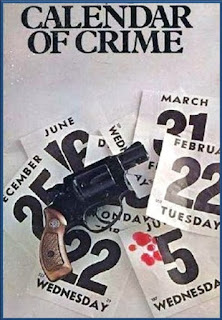 I have no excuse to offer for our having consented to such an unheard-of proposition, except that writers generally do screwy things. (p. 16)
I have no excuse to offer for our having consented to such an unheard-of proposition, except that writers generally do screwy things. (p. 16)4 Feet in the Grave (1941) by Amelia Reynolds Long
Katherine "Peter" Piper, mystery writer by trade and amateur detective by inclination, is invited to Ghost Walk, the home of a fellow author, for a little Halloween get-together of their writing circle. She and her close friend Althea Raeburn head to Philadelphia for what was intended to be an ordinary Halloween party with "Materialization and other psychic phenomena guaranteed." But as Peter says to us
...if I could have known then about the ghostly lights in the mausoleum and the corpse that appeared and disappeared, to say nothing of the pistol that shot and killed a man in full view of eight witnesses, yet without being touched by human hand, I wonder whether I would have been so quick to sit down and write my acceptance....I say I wonder--and know darned well that I would.
There you have it in a nutshell. Well almost. She leaves out the mystery woman who gives them a lift when their car gets stuck in the mud and who insists on joining their party as Althea's "sister-in-law" when she finds out where they're headed. And the murder of the previous owner of the house. And the ominous warning from the tarot cards She also leaves out the "ghost" who appears in front of the bookshelf and the puzzle of the three wills--all apparently perfectly legitimate.
Well, that was a delightful little surprise. I'd never read anything by Amelia Reynolds Long before and really didn't know what to expect. In fact, I'd never heard of her before acquiring this Bart House edition several years ago. She started out as a science fiction writer in the 1930s and then turned to mysteries--producing 31 novels under her own name and several pseudonyms. If this effort is anything to go by, she excelled at characterization, dialogue, and plotting (roughly in that order). She makes a good effort to produce a baffling impossible crime and I thought it interesting that, rather than leading with that particular murder, the impossible crime is the final death in the criminal's game. I'm not entirely sure that the solution works, nor that it is a novel one but I did enjoy how she employed it.
I also enjoyed the interactions between Peter Piper, our intrepid amateur sleuth, and Edward Trelawney, with "connections" to the district attorney's office, as they try to work out who was killed when and how the final murder was committed at all. It is difficult to find much information on her or her books (see link on her name above), so I'm not sure if this detective duo appears in any of her other mysteries--I would hope so and would also hope that I'll be lucky enough to find them. I have to say that I had my suspicions about the villain of the piece, but I certainly didn't pick up all the clues--particularly those that would have helped in the solution of the final murder. A fun read. ★★★★
Quotes
I know what I saw, and it was a dead man. The fact that somebody came and carried him away while I was phoning for you, wasn't my fault. After all, you couldn't expect me to sit on his chest to keep him until you got here. (Katherine "Peter" Piper; p. 88)
"Oh, what's one corpse more or less in my life?" I retorted with a brazenness I was far from feeling. "I'm used to them by this time." (Peter Piper; p. 109)
"Read," he replied irritably. "Hell, no! All this house seems to contain in the line of reading material is a lot of damned detective stories; and after living in one for the past couple days, I break out in a nervous rash at the very thought of them." (Bill Blake; p. 135)
Bill's ideas about women and their ability to take care of themselves are a little narrow; and he probably had come to feel during the past few days that they had been more than justified. (p. 159)
"Well," I barked at him, "it's about time you got here. A person could be murdered two or three times waiting for you." (Peter Piper; p.179)
Circumstantial evidence may be misleading; even direct testimony may be mistaken or deliberately false. But once all the factors have been taken into careful consideration, psychological evidence never lies. (Edward Trelawney; p. 183)
Of course, psychological evidence alone is not enough. It must be combined with proven motive and opportunity. And even then these must be backed up by a certain amount of material evidence, and rightly so; since the average juryman is not a trained psychologist. (Trelawney; 183)
I seem to have the knack of solving mysteries without realizing it. I can't decide whether it's a sign of intelligence or the opposite. (Peter Piper; 185-6)
***************
Deaths = three shot
Calendar of Crime: October (set at Halloween)












































